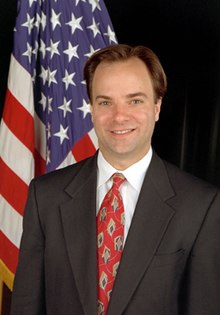Mark McClellan
| Mark McClellan | |
|---|---|
 |
|
| Administrator of the Centers for Medicare and Medicaid Services | |
|
In office March 25, 2004 – October 14, 2006 |
|
| President | George W. Bush |
| Preceded by | Dennis Smith (Acting) |
| Succeeded by | Leslie Norwalk (Acting) |
| Commissioner of Food and Drugs | |
|
In office November 14, 2002 – March 25, 2004 |
|
| President | George W. Bush |
| Preceded by | Jane Henney |
| Succeeded by | Lester Crawford |
| Personal details | |
| Born |
June 26, 1963 Austin, Texas, U.S. |
| Political party | Republican |
| Alma mater |
University of Texas, Austin Harvard University Massachusetts Institute of Technology |
Mark Barr McClellan (born June 26, 1963) is the Director of the Robert J Margolis Center for Health Policy and the Margolis Professor of Business, Medicine and Health Policy at Duke University. Formerly, he was a senior fellow and director of the Health Care Innovation and Value Initiative at the Engelberg Center for Health Care Reform at The Brookings Institution, in Washington, D.C. McClellan served as Commissioner of the United States Food and Drug Administration under President George W. Bush from 2002 through 2004, and subsequently as administrator of the Centers for Medicare and Medicaid Services from 2004 through 2006.
After graduating from the University of Texas in 1985 majoring in English and Biology, he earned his M.D. degree from the Harvard-MIT Division of Health Sciences and Technology in 1992 and his Ph.D. in economics from MIT in 1993. He also earned a Master of Public Administration degree from the Harvard University Kennedy School of Government in 1991. He completed his residency training in internal medicine at Brigham and Women's Hospital, and he is board-certified in Internal Medicine. McClellan's research studies have addressed measuring and improving the quality of health care, the economic and policy factors influencing medical treatment decisions and health outcomes, estimating the effects of medical treatments, technological change in health care and its consequences for health and medical expenditures, and the relationship between health and economic well-being. He has twice received the Arrow Award for Outstanding Research in Health Economics.
...
Wikipedia
